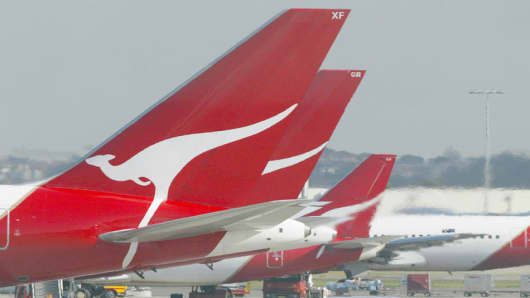Australia's Qantas Airways said on Friday it will hold talks with striking aircraft engineers on Monday to try to resolve a wage dispute which has disrupted flights around Australia.
Qantas cancelled 19 domestic flights on Friday in the latest disruptions after members of the Australian Licensed Aircraft Engineers Association (ALAEA) walked off the job in four of the country's biggest cities in support of a 5 percent wage rise.
Their campaign has disrupted flights in Sydney, Melbourne, Brisbane and Perth over the past week, with Qantas offering a 3 percent wage rise to around 1,500 engineers.
"Qantas has confirmed it is meeting with the union on Monday," a spokeswoman told Reuters on Friday.
Qantas has begun carrying out aircraft maintenance offshore and said it could permanently move jobs offshore if the rolling work stoppages continue.
The carrier is looking to employing engineers in London and the United States, possibly antagonizing union members at home.
Prime Minister Kevin Rudd has refused to intervene in the dispute, saying wage decisions were difficult for every company, but said he hoped Qantas would keep its maintenance jobs onshore.
"But we're not in a position, nor were our predecessors, to dictate what individual companies do," Rudd told Australian radio on Friday.
Qantas flies 2,400 domestic flights each week, excluding low-cost subsidiary Jetstar and regional carrier QantasLin, or around 342 flights each day.
The carrier, Australia's biggest airline, reported net profit of A$617.6 million for six months ended December, doubling its first-half earnings on strong demand for air travel and trimmed fuel costs.
Qantas, the world's 10th-largest airline by market value, said in May said it still expected to achieve its target of 40 percent profit growth for the current year, which ends on June 30.
The airline, like many other Australian firms, is facing a conundrum with inflation running at just over 4 percent, while workers are demanding bigger pay rises in line with a booming resource economy in its 16th year of expansion.


